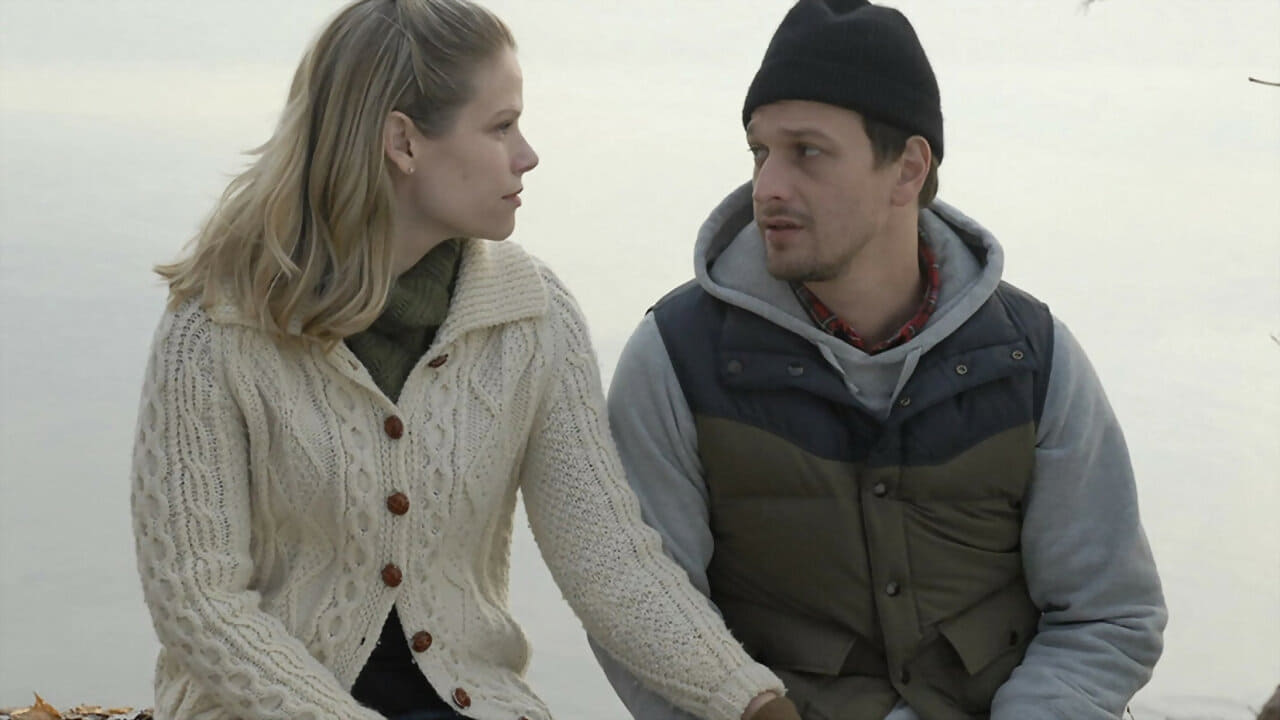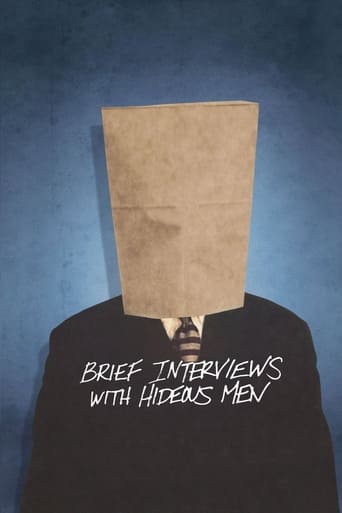

College student Sara Quinn (Julianne Nicholson) conducts a study by interviewing men with stories of disturbing behavior. She also starts observing men in the outside world. She has dates with Ryan (John Krasinski).Nicholson is playing it very passively. The interviews are visually extremely static. There are so many men as subjects that none of them are compelling enough to care about. I suspect that the source material is difficult to adapt. John Krasinski may not be equipped to do so much of the heavy lifting. In the end, he did not find a way to translate this into a watchable movie.
... View MoreThere are a lot of good dramatic performances in this film, but sadly they are all wasted since there's no point to the movie that I could discern, no consistent style or character development or anything else you might reasonably expect. It starts with an interviewee who confesses that he involuntarily calls out a ridiculous phrase about political freedom during climax, so you think - OK, it's going to be all-out Python-esque comedy, then nothing else in the movie matches that tone. It seems like a bunch of auditions for different types of movies stitched together, with an after-thought theme tacked on (a woman trying to make sense of her abandonment by a lover). Basically it's self-indulgent film-school pretentiousness masquerading as some sort of deep psychological exploration.
... View MoreI have read Infinite Jest, and am a fan of David Foster Wallace's work. Rather than making the obvious Book>Movie comment, I would like to comment on where it worked and where it didn't. DFW, for me, brings to mind the haunting descriptions of melancholy missing from the movie(Though John Krasinski does a decent job in his monologue, surprisingly.) The editing, though true to the style in the book to a certain extent, could have been better on screen.DFW's linguistic talents and extensive vocabulary are retained throughout the movie, which makes it seem unreal(DFW does a great job of separating his voice from that of his characters, I feel). This leads to a strange sequence with the man speaking of his father which is strange to watch.The movie suffers from trying to be a bit too true to the book, but not really knowing how to. There are a few intense scenes reminiscent of DFW's style, but can't really hold the whole movie together.All in all, I wouldn't call the movie a waste of time, but I'd recommend DFW's books anyway.
... View MoreThis film "Brief Interviews with Hideous Men" is adapted from a collection of short stories of the same title by the deceased David Foster Wallace. The short story form remains paramount. Several themes are investigated: what is love? what bonds a couple together? how do private life events affect public research agendas? what b.s. is stereotypically common? You might assemble ideas in a novel way; you might have an epiphany ...but you might not. The story doesn't much care. What's more important is the dramatic arc of the story itself.I didn't notice the running length of the film (although several others have commented on its relative shortness). To me the length was "right" for the story. Figuring out the time sequence of the events might be tricky, and might steal your attention more than it should; keep the synopsis "a graduate student copes with a recent breakup by conducting interviews with various men" in mind at all times.There's lots of variety in the ways the mens' stories are told. Initially I imagined a list of unbroken formal interviews back to back - various "talking heads" sitting on the same chair in front of the same wall. But the reality of the film isn't like that at all. Each of the threads makes use of different devices: flashbacks, flashforwards, flashsideways; intermixing formal interviews with informal contacts; overheard conversations; jumping between internal narration and external events; casual conversations at house parties and academic department parties and bars; imagination played out realistically right in front of your eyes; characters morphing into others; asides with related characters; and so forth. And almost all of the threads are broken into segments that are intermixed with other threads; themes are much more of an organizing principle than time. Even the formal interview segments are broken up by cuts --or faux cuts-- so there's never a dull visual moment.Some of the cut techniques are new to me. In every case the sound is seamlessly continuous - a spoken sentence remains a spoken sentence without any gaps or shifts. But the words are sometimes split between the same character at different times saying the same thing. Or they're split between different characters speaking a very similar --or even the exact same-- thing. Or they might (and this is what I've termed "faux cuts") have a hitch in the image as though a few frames had been spliced out - nothing as big as a change of camera angle, but a visual discontinuity nevertheless. (Are these faux cuts the next "Ken Burns effect"?) To my mind considerable audio and visual editing skills --well beyond what's typical of most new director's efforts-- are demonstrated here; the conventional words are "production values are high".If you listen very closely there are a few internal jokes. For example usually the interviewer pokes the tape recorder and says "do you mind if I turn this on?" But once she says "do you mind if I turn this off?" The words make no sense and aren't consistent with the action, and are easily overlooked.I liked the adaptation of the short story form, and I hope it blazes a path for other future films. To my mind the weak link though is the acting. Much of the material is extremely subtle and challenging, and would overwhelm even many A-list stage actors. But the film's actors are neither veterans nor geniuses. I found a couple of the casting decisions just plain jarring: one of the waiters seemed awfully wooden, and failed to convey some intended humor; and the imagined father figure bathroom attendant looked younger than his son! Apart from these, the acting varies from workmanlike up to quite good ...but nobody "burns up the screen" even when the material cries out for it.The well-known TV persona and skills of the director (which admittedly I'm not at all familiar with:-) don't seem to be any sort of guide to something as completely different as this. Like a typical "art house" film, this is not for everybody. At the small screening room where I saw it, one person noisily fell asleep and another walked out. But while this film asks for an open mind and some investment of mind-share, you'll be richly rewarded.POSTSCRIPT: I've become aware from some others' comments and from an interview with John Krasinski that some of my impressions and even some of my "facts" may be so far off the mark they're just plain back-assward. I seem to have missed some of the comedy, misidentified some of the characters, misjudged some actors' experience levels, and who knows what else. Now I'm doubting myself, wondering if I really saw the same movie or if I paid sufficient attention the first time. Ambiguity and multiple interpretations are part of the point, but not so much as to account for all the distance between my views and some others. I'm now resolved to watch this film a second time. In the meantime please put what I've opined under advisement -- and go see for yourself.POST-POSTSCRIPT after second viewing next day: I couldn't find any evidence of "the hitchhiker" character, either in the film itself or in the credits. My hypothesis is after Lucy Gordon's unfortunate death but before final release, the film was re-cut to remove all the scenes that included her. My guess is there were originally a lot of flashbacks in what's now John Krasinski's monologue. That's where the hitchhiker's story appears to fit best, lots of cuts there too would have made that segment much more stylistically similar to the rest of the film, and the film would have had a more typical length. Also, I've softened my view on the acting – many of the performances are really very good. My bottom line is unchanged though: in the end the extraordinary material overpowers the acting. We're talking King Lear here, but we're not quite talking Laurence Olivier.
... View More